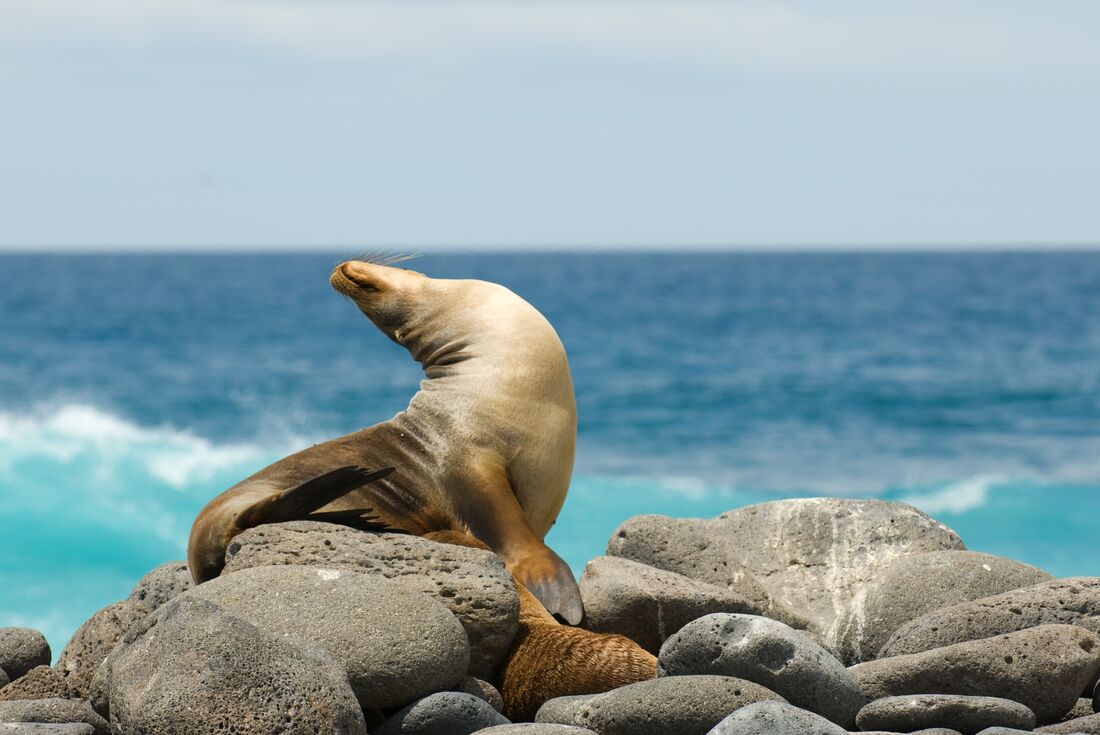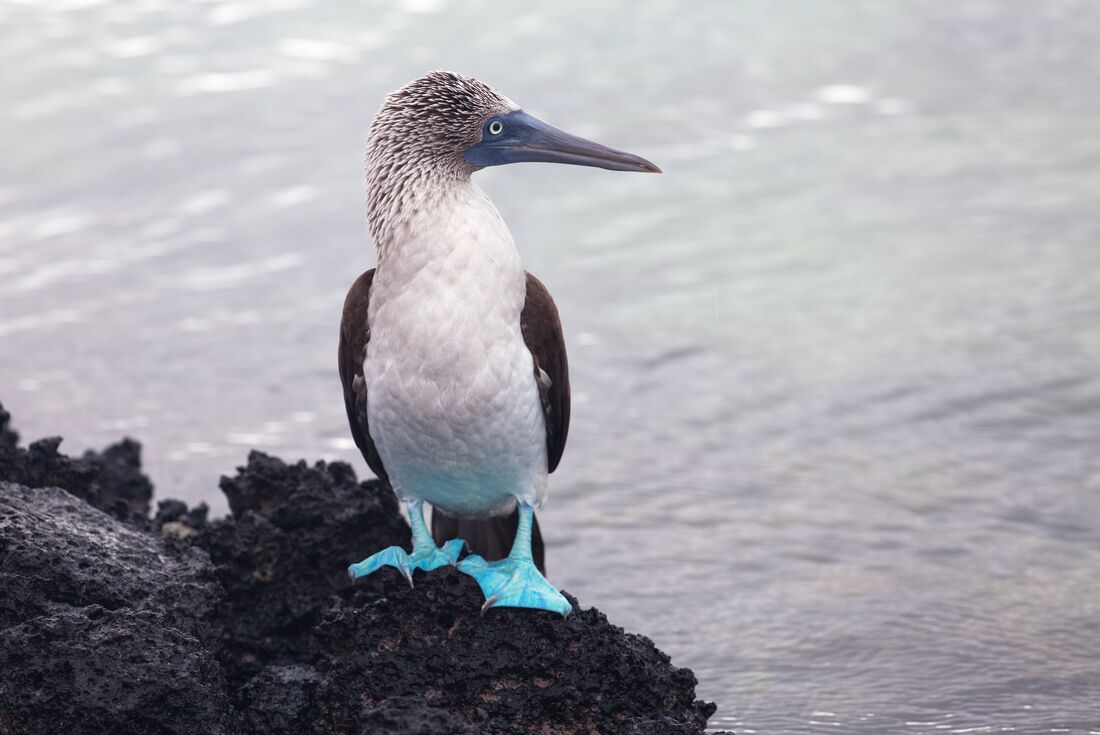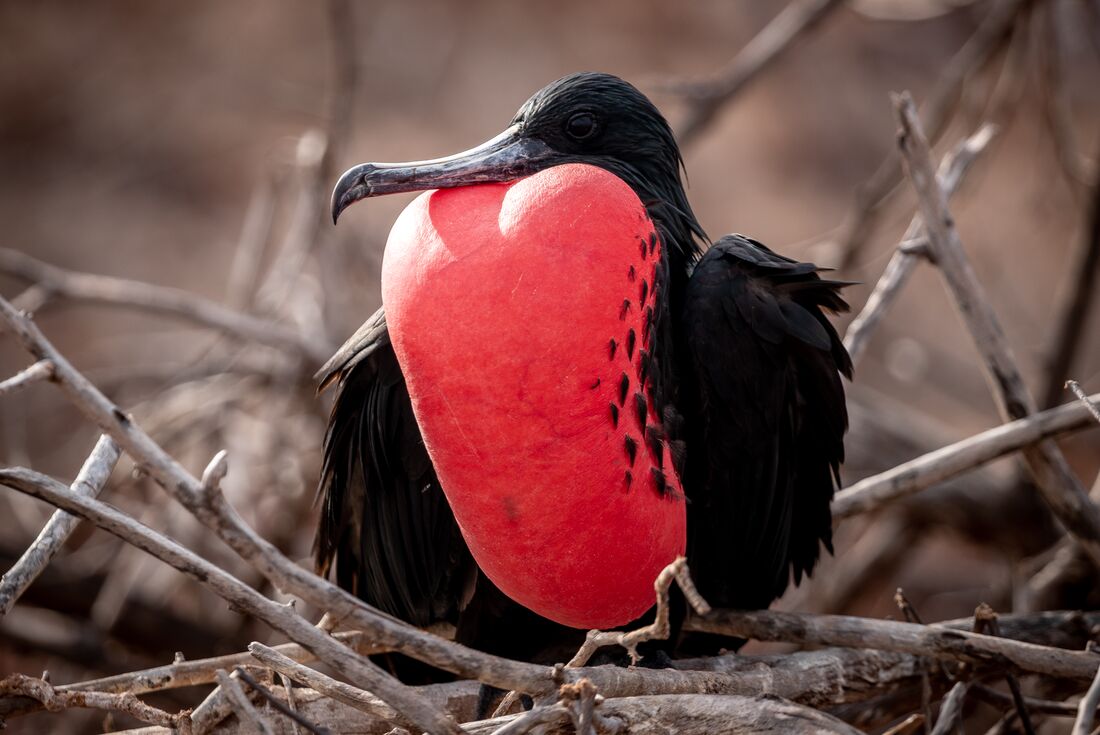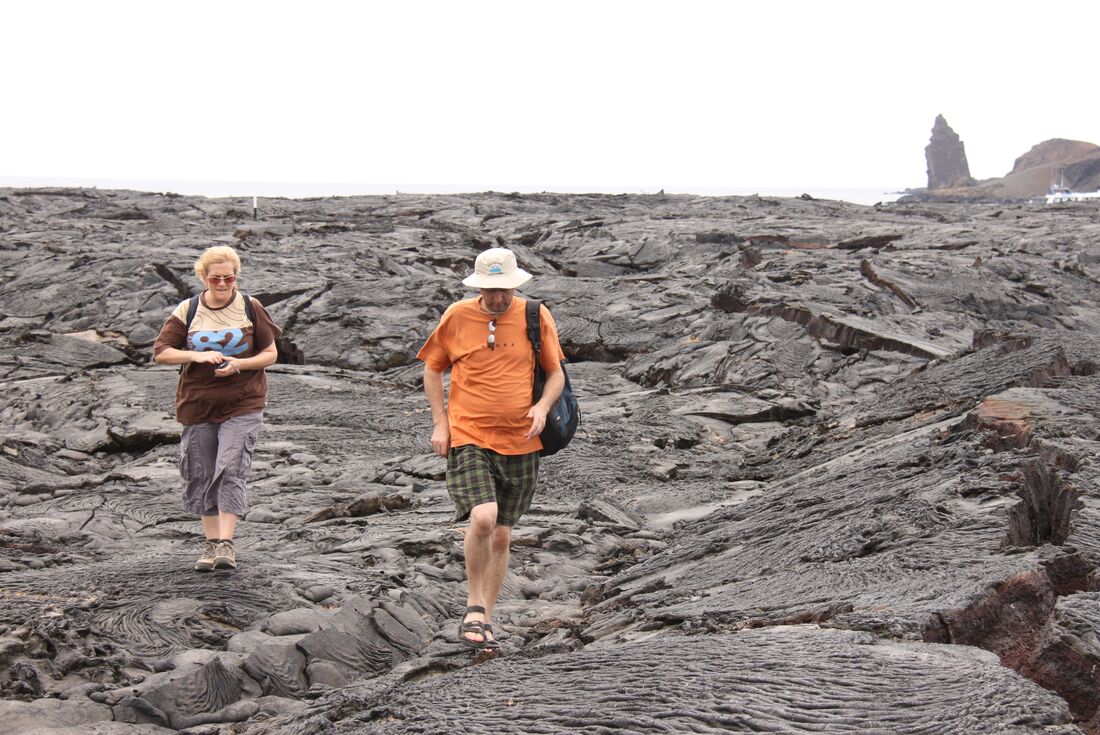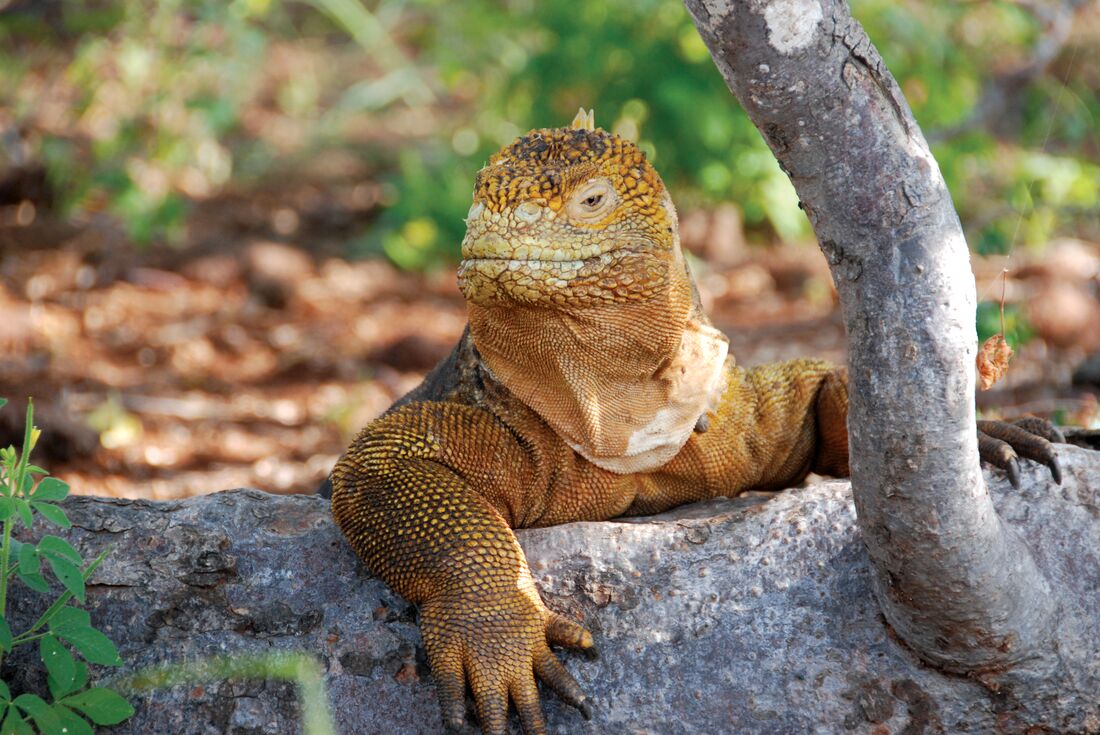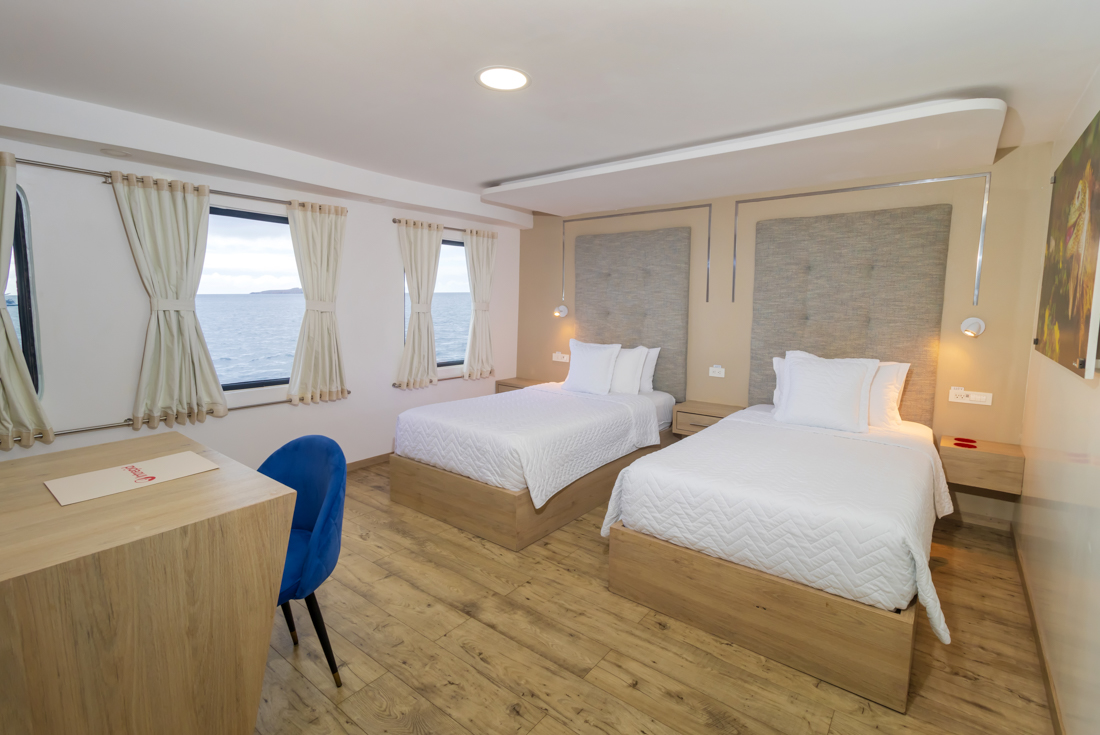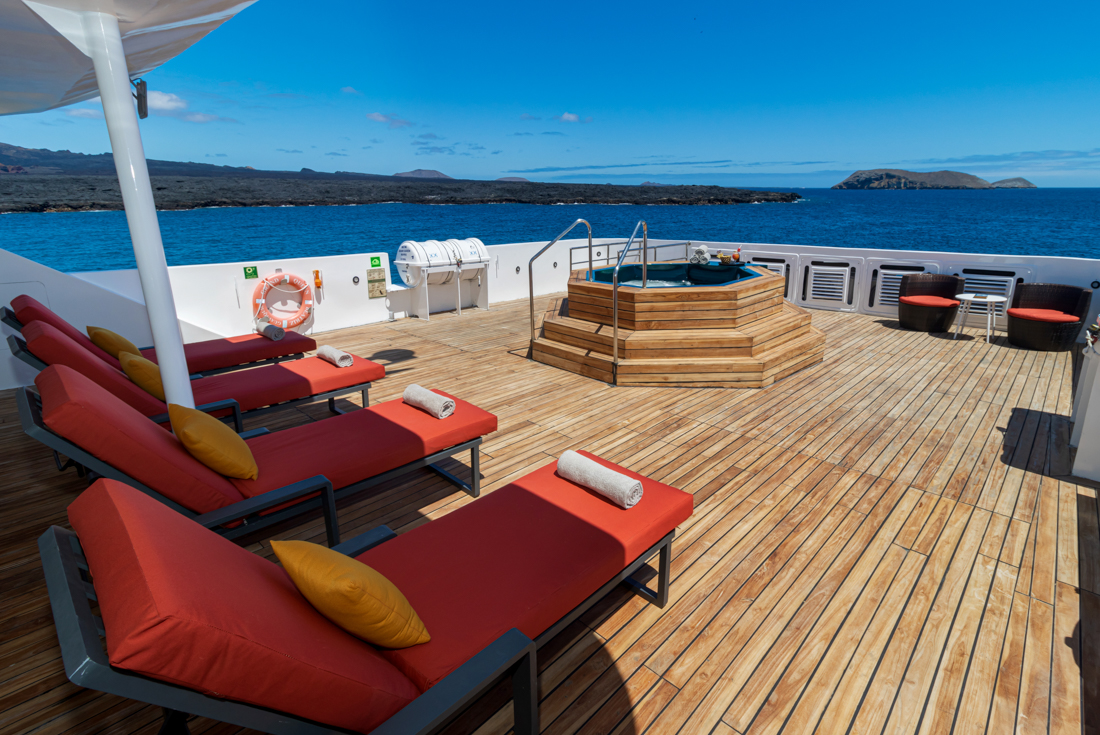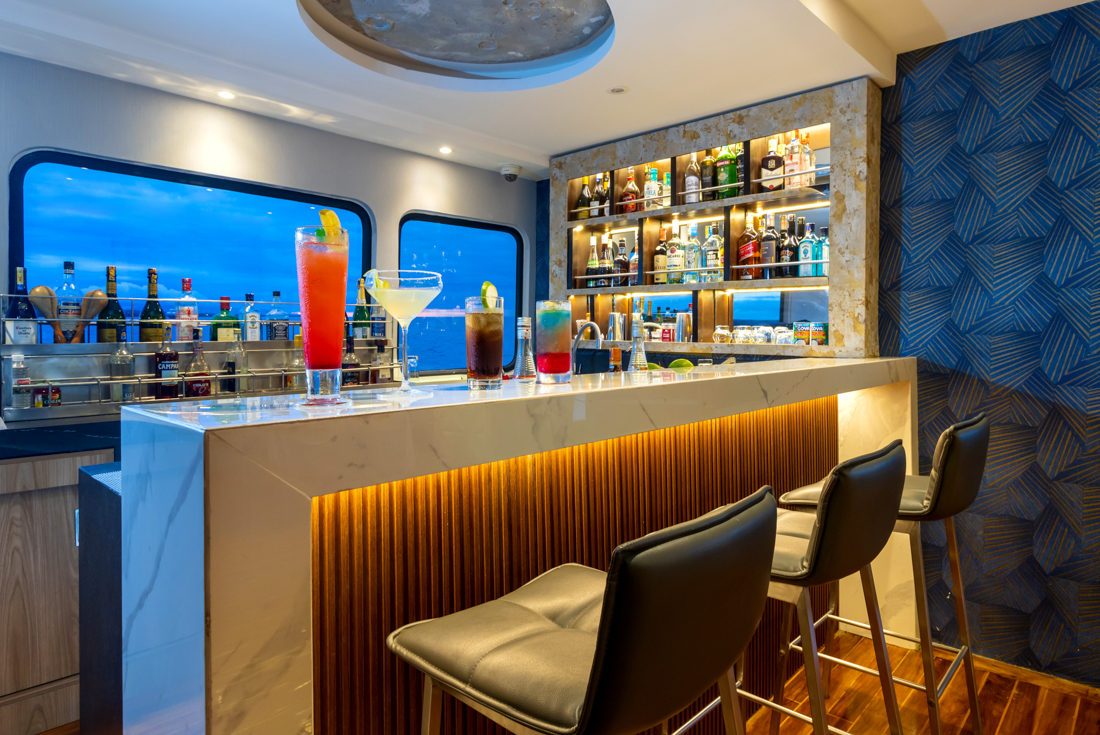- As you board your vessel, M.Y Grand Queen Beatriz, and follow in the footsteps of Charles Darwin, you will encounter nature at its finest.
- Encounter Galapagos’s wildlife, including giant Galapagos tortoises, blue-footed and Nazca boobies, pelicans and frigate birds, as well as iguanas, sea lions, fur seals and sea turtles.
- Explore the islands from on deck, on foot and in the water, no doubt with your eyes open for your next unique sight. This is indeed the Galapagos journey with something for everyone.
- By travelling on this trip, you’ll learn about our Intrepid Foundation partner, The Galapagos Conservancy. Donations support their Women in Sustainable Entrepreneurship (WISE) program, providing capital for sustainability initiatives and empowering female entrepreneurs in the Galapagos. Intrepid will double the impact by dollar-matching all post-trip donations made to The Intrepid Foundation.
07 Feb 2024
Galapagos Voyager: Central Islands (Grand Queen Beatriz)
GMQK
Validity: 01 Jan 2022 to 31 Dec 2024
Climb aboard the stylish Grand Queen Beatriz and experience a superb spread of Ecuador’s famous wildlife-filled islands. As well as visiting the must-see icons of the archipelago – such as Isla San Cristobal’s frigate birds, Isla Santa Cruz’ giant tortoises, Pinnacle Rock and Isla Bartolome’s Pinnacle Rock – this 13-day itinerary covers key central islands. Among them are North Seymour, with its beautiful trails and birdlife, and Isla Rabida, with its indigenous wildlife and striking scarlet shores. With volcanic landscapes, sea turtles, marine iguanas, spectacular sea birds and possibly even hammerhead sharks on the agenda, this is an essential Galapagos adventure for animal lovers, keen snorkellers and photographers alike.
Comfort
Adventure Cruising,Wildlife
Minibus,Boat,Plane,Zodiac
3
Galapagos Voyage No particular level of physical fitness is required for our Galapagos voyages, although you should be reasonably agile and enjoying good health. We do ask that you read through the trip notes to ensure that this trip is right for you. Please keep in mind that there are a number of shore excursions on your cruise. This involves boarding a small dingy or zodiac from the rear transom of the cruise boat. Disembarkation at some locations will be at steps or a small pier (dry landing), whilst at other locations you may be required to disembark on the beach (wet landing). This can involve having to wade ashore a short distance through shallow water. A degree of agility will be required for this. Once you are on shore you will undertake several walks, some across volcanic rock. For this a reasonable level of fitness is beneficial, as is a pair of good walking shoes or boots. You are more than welcome to opt out of activities or talk to your guide about tailoring a less physical option for you. The cabins and the communal areas of the Grand Queen Beatriz are spread over 4 decks: From the zodiac to the main deck there are 6 steps From the main deck to the first level there are 10 steps From the first level to the second there are 10 steps From the second level to the sundeck there are 10 steps Snorkelling There are many opportunities to go snorkelling on our voyages. Confident swimming skills are required to take part in this activity. Depending on the weather conditions and park regulations, you could be snorkelling twice a day. If you take part in the snorkelling, you will not miss out on any land activities. For those not wanting to snorkel, there will be time to relax on the boat. Altitude Quito is located at 2850 metres above sea level. At this altitude you may experience some of the milder effects of altitude sickness, such as dizziness, insomnia and a shortness of breath. If so, we recommend you avoid any strenuous activity.
Hotel Le Parc
República de El Salvador N34-349 & Irlanda
Quito
ECUADOR
Phone: +593 22276800
A Complimentary arrival transfer is included from Quito Airport to your hotel on day one or if you have prebooked hotel accommodation with Intrepid. Please make sure that you provide your flight details no later than 14 days before departure to book your arrival transfer with us. For your confirmed arrival transfer, you’ll be met at Quito Airport International Arrivals by a transfer representative holding an Intrepid sign. In case of flight cancellations, changes, if you experience severe delays at immigration, baggage collection or customs, or if you are not able to find the driver, please contact our local office on the number in the ‘Problems and emergency contact information’ section.
Hotel Le Parc
República de El Salvador N34-349 & Irlanda
Quito
ECUADOR
Phone: +593 22276800
FELLOW TRAVELLERS: This trip is a package tour and is therefore made up of a combination of shorter trips. This may mean you will travel with a different guide and passengers on each section. GALAPAGOS PARK, TRANSIT CARD & ISABELA ISLANDS PORT FEES: Before checking in for the flight from Quito to the Galapagos, there is a US$20 transit fee that needs to be paid. On arrival in the islands you must pay the US$100 national park fee to enter Galapagos National Park. If your voyage visits Isabela Island, there is also a US$10 fee to be paid on arrival at the island. ARRIVAL TRANSFER: This tour includes a complimentary arrival transfer in Quito. Please advise flight details 30 days prior to travel so that the transfer can be organised. PASSPORT DETAILS: When booking, please make sure that your name is spelt correctly, and that you book using the name in your passport (particularly if you are recently married). If you are issued a new passport with a different number between the time that you book and the time you travel, please take both the old and new passports with you. DIETARY REQUIREMENTS: Should you have a special diet requirement (for example vegetarian, celiac, vegan, severe food allergies) it's essential that you inform us or your agent of the specific details at least 10 days prior to departure, in order to make sure the chef on board the boat or on the island can request the necessary food supplies. TEMPORARY ITINERARY CHANGE for departures in January and February 2024 Due to the confirmed cases of Avian Influenza H5N1 or "bird flu" as its commonly known being reported in the Galapagos Islands, a temporary itinerary change will be in place for all departures in January and February 2024. Please see further information in the "itinerary Disclaimer" section of the Essential trip information for the current itinerary.
On our Galapagos trips you will be meet on arrival by our experienced local representatives. They will conduct the group briefing on the evening of day 1 of the trip and also transfer with you to the airport on day 2 for your flight to the Galapagos. On arrival in the Galapagos you will be met your Guide. Our Guides are registered and trained in conservation and natural sciences by the Charles Darwin Foundation and licensed by the Galapagos National Park Service. The Guide will be on board with you for the duration of the trip and will accompany you on all excursions. Our boats are also staffed by highly experienced shipboard staff and crew.
Many national governments provide a regularly updated advice service on safety issues involved with international travel. We recommend that you check your government's advice for their latest travel information before departure. Please refer to our website's safety page for links to major travel advisories and updates on safety issues affecting our trip. We strongly recommend the use of a neck wallet or money belt while travelling, for the safe-keeping of your passport, air tickets, cash and other valuable items. Leave your valuable jewellery at home - you won't need it while travelling. Many of our hotels have safety deposit boxes, which is the most secure way of storing your valuables. A lock is recommended for securing your luggage. In addition to any included activities on your trip you'll have some free time to pursue your own interests, relax and take it easy or explore at your leisure. Our local representative may be able to assist you with available options in a given location, please note that any optional activities you undertake are not part of your Intrepid itinerary, and Intrepid makes no representations about the safety of the activity or the standard of the operators running them. Please use your own good judgement when selecting an activity in your free time. Please also note that our local representative has the authority to amend or cancel any part of the trip itinerary if it's deemed necessary due to safety concerns. Petty theft & Personal Safety : While travelling there is always the risk of pick-pocketing and petty theft, particularly in the more touristy cities. We recommend that you exercise caution when walking alone at night and encourage you to walk together and only on main, well-lit thoroughfares. Be particularly vigilant on public transport. Simple measures like carrying your day pack on your front, not hanging your bag over the back of your chair and wearing a money belt will reduce any chance that your valuables should go missing. Water Safety: Please take care when taking part in any activities in the ocean, river or open water, where waves and currents can be unpredictable. It's expected that anyone taking part in water activities is able to swim and have experience in open water. All swimmers should seek local advice before entering the water. Life Jackets: Peregrine will provide life jackets for private boats, but cannot guarantee that all public ferries will have enough life jackets or life rings for all clients. Diving in the Galapagos: We do not offer diving as a part of our Galapagos program and due to our internal safety policy our leaders are specifically prohibited from recommending or assisting with booking this activity.
Electricity in Ecuador and the Galapagos Islands is 110 - 120V and requires US plugs so you may need to take an adapter. Wi-Fi is not available on the boat at all whilst in the Galapagos Islands. There is limited access on the bigger islands of Santa Cruz, San Cristobal and Isabela and there may also be internet cafes for you to use if there is time. Like Wi-Fi, mobile phone coverage is pretty non-existent whilst travelling around the islands. Again, you may find that you have limited service when you are closer to the bigger islands. There is a radio on board, for the use of shipboard staff, in case of emergency.
PASSPORT You’ll need a valid passport to travel internationally and most countries require your passport to have a minimum of 6 months validity, so remember to check the expiry date. We need your passport information to get everything ready for your trip so it’s important that the information on your booking matches your passport exactly. Please take care to provide the correct details. We recommend carrying a copy of the photo page of your passport while travelling and leaving a copy at home with family or friends. VISAS & ENTRY REQUIREMENTS Many countries require a visa and obtaining the correct visa for your trip and any countries you may transit through is your responsibility. We recommend you check your visa requirements as soon as you have booked your trip. This will ensure you have time to prepare your documents and for your visa application to be processed. You can check the entry requirements for your nationality on your government's foreign travel advisories, consular websites or on our page here: www.intrepidtravel.com/visa-entry-requirements
As you board your vessel, M.Y Grand Queen Beatriz, and follow in the footsteps of Charles Darwin, you will encounter nature at its finest.
Encounter Galapagos’s wildlife, including giant Galapagos tortoises, blue-footed and Nazca boobies, pelicans and frigate birds, as well as iguanas, sea lions, fur seals and sea turtles.
Explore the islands from on deck, on foot and in the water, no doubt with your eyes open for your next unique sight. This is indeed the Galapagos journey with something for everyone.
By travelling on this trip, you’ll learn about our Intrepid Foundation partner, The Galapagos Conservancy. Donations support their Women in Sustainable Entrepreneurship (WISE) program, providing capital for sustainability initiatives and empowering female entrepreneurs in the Galapagos. Intrepid will double the impact by dollar-matching all post-trip donations made to The Intrepid Foundation.
You’ll need to feel comfortable with the included activities and with moving about the boat. The cabins and communal areas of the boat are spread over three decks, and the steps between the decks are steep. You will be entering and exiting a Zodiac boat (panga) during wet and dry landings and when returning from snorkelling. Although the waters we sail are usually calm, there are times when the sea can get rough and choppy. Steady sea legs (and a sturdy stomach) are needed when walking around the boat during bad weather. Rain or shine, your trusty crew will always be on hand to assist you. While at sea and when exploring the islands, you may be exposed to the sun for large parts of the day. It’s important to use sun protection and drink plenty of water. Please note that while there is an itinerary in place, some changes may occur due to the weather or because of direction from the local authorities. This can happen with little notice so please be prepared for potential modifications to the route or activities. A sense of humour and flexibility will ensure you have a fun, relaxing trip through this beautiful part of the world no matter what happens.
GENERAL HEALTH All travellers need to be in good physical health in order to participate fully on this trip. For the safety and wellbeing of yourself and others, if you are unwell prior to travelling, please stay at home and contact us to make alternative arrangements. When selecting your trip please make sure you have read through the itinerary carefully and assess your ability to manage and enjoy our style of travel. Please note that if in the assessment of our group leader or local representative a traveller is unable to complete the itinerary without undue risk to themselves and/or the rest of the group, we reserve the right to exclude them from all or part of a trip without refund. You should consult your doctor for up-to-date medical travel information or for any necessary vaccinations before departure. We recommend that you carry a first aid kit as well as any personal medical requirements in their original packaging as they may not easily be obtained while travelling. If you are carrying medication, ensure you check your government's foreign travel advice for any local restrictions or requirements. SUNSCREEN While at sea and when exploring the islands, you may be exposed to the sun for large parts of the day. It’s important to use sun protection and drink plenty of water. YELLOW FEVER A valid international certificate of vaccination against Yellow Fever is required in many countries. You may need to present this on arrival at the airport or border crossing. Some countries will refuse entry if you are unable to present your certificate. It's also quite common for your home country to request a Yellow Fever certificate on your arrival back home. It is your responsibility to check with your doctor well in advance of leaving home about the Yellow Fever requirements for the countries you'll be visiting. The Galapagos Islands are located about 1000kms off the coast of Ecuador mainland and many of these islands are uninhabited by humans. The populated islands of Santa Cruz and San Cristobal have medical facilities however they are limited in what procedures they can perform and have limited medical supplies. If you have a pre-existing medical condition, please ensure you have travel insurance to cover this. Travel insurance should also cover the cost of repatriation or if any additional supplies are needed to be flown in from the mainland. We know that many travellers have travelled to other parts of South America before the Galapagos and during this time have contracted a stomach bug. If you are feeling unwell at the time of the briefing or at anytime on the voyage, please let our representative or guide know. Travelling on a boat means that everyone is sharing the same common areas which means that if one passenger is feeling unwell, this can be spread to your fellow travellers. We want to maximise your time on the boat and for you to enjoy the experience and the best way to do that is to ensure that everyone is healthy. ALTITUDE SICKNESS Please note a very small number of travellers do feel the affects of altitude sickness when they arrive in Quito. Please refer to https://www.intrepidtravel.com/au/altitude-sickness SEA SICKNESS- GALAPAGOS Please note that from June to August the water is rougher than usual. Consequently travel times will be longer than usual. If you suffer from seasickness you may want to reconsider travelling during this period. CPAP Machines: If you are travelling with a CPAP machine there should be uninterupted power throughout the night however we suggest you travel with a fully charged back up battery just in case. If you are travelling by yourself, we highly recommend that you book a single supplement to limit disruption to other passengers. The sockets on board the Grand Queen Beatriz are the two pronged plugs used in the US, Canada and Japan.
Breakfast is included at the Hotel Le Parc (as you have an early departure to the Galapagos on day 2 the hotel prepares a packed breakfast). All meals are included onboard the Queen Beatriz, this includes breakfast, lunch, dinner and snacks. Tea, coffee and cold water is available at any time during the day [or night]. Most meals are served buffet style. Here is an example of the typical meals served: Breakfast Toast, spreads, muesli, eggs with fresh fruit and fruit juices Lunch A mix of hot and cold dishes plus salads or vegetables and fruit salad and juice Dinner Fresh seafood, chicken or pork, pasta, rice, vegetables, salads and dessert. If you have dietary requirements and/or food allergies please notify us at the time of booking so we can determine the extent to which your dietary requirements can be met. We will endeavour to accommodate all requests but please note that we have limited refrigeration and storage space on board the Galapagos boats and there is very limited (if any) access to shops or supermarkets. Vegans, coeliacs or those with specific meal requirements might choose to supplement meals with supplies bought from home, e.g. protein bars. Please note that the Galapagos does have strict quarantine laws when it comes to bringing in goods from the mainland.
The official currency of Ecuador is the US dollar (USD). Please note that in Ecuador automatic money machines often limit the amount you can withdraw. This can be $100 or $200 per day depending on your card. ATM's are available in Puerto Ayora, Isla Santa Cruz and Puerto Baquerizo Moreno, Isla San Cristobal however there are no ATM's in Puerto Villamil, Isla Isabela. Credit cards are accepted in some shops and stores in Puerto Ayora, Puerto Baquerizo and Puerto Villamil. For boat trips only: On board the Galapagos voyage, alcoholic [beer and wine] and soft drinks are available to purchase in cash and if you wish to tip the crew this will also be paid in cash. Every traveller is different and therefore spending money requirements will vary. Some travellers like to purchase more souvenirs than others, others prefer to visit more optional sites. Remember that alcoholic beverages are expensive compared to other foods locally. Please consider your own spending habits when it comes to allowing for drinks, shopping, participating in optional activities. We recommend you carry at least US$100 to allow for additional meals and snacks. There is a bar on board and it is recommended you settle the bill in US$ cash. The Grand Queen Beatriz does have credit card facilities but there is a minimum of US$100 and it is not always a reliable source of payment as there can sometimes be connection issues so please ensure you carry back-up cash to settle the bill. Please make additional allowance for bar expenses. Please note, all produce is freighted in to the Galapagos making the price of food, alcohol and other goods more expensive on the islands and on board than what you will find on the mainland. All prices are quoted in US$. Wine* – 35 to 70 USD Champagne** - 35 USD Cocktails – 8 to 10 USD Hard spirits (Vodka, Gin, Pisco, Brandy, Tequilla, Baileys) – 8 to 10 USD Small local beer – 5 USD Imported beer (Corona, Heineken) – 7 USD Soft drinks – 2 to 4 USD *Red, white and sparkling wines are available by the bottle **Champagne is only available by the bottle Please note that a 10% service charge from the boat and a 12% government tax will be added to the total of your bar bill when your tab is settled at the end of your trip. It is not permitted to bring your own alcohol on board the boat. During stops in Santa Cruz, San Cristobal and Isabela Islands, you will have the opportunity to visit souvenir shops and internet cafes. NATIONAL PARK AND TRANSIT CARD FEES Before you check-in for your flight from Quito to the Galapagos Islands you will need to purchase a US$20 transit card [which you will need to hold on to as you will need to present it on your return from the Galapagos]. On arrival in the islands you will purchase the Galapagos National Park entry fee, US$100. If your tour visits Isabela Island, you will also be required to pay a US$10 port fee. Please make sure you have clean, unmarked notes to pay these fees. WHAT'S NOT INCLUDED: Any airfare unless otherwise specified in the itinerary. Passport and visa expenses. Government arrival and departure taxes. Galapagos National Park fee and Galapagos transit card. Isabela island port fee (if applicable). Optional activities Baggage, cancellation and medical travel insurance. Excess baggage charges. Laundry, bar, beverage and other personal charges unless specified. Telecommunications charges. The voluntary gratuity at the end of the voyage for shipboard staff and crew. CONTINGENCY FUNDS We try to plan for every eventuality, but there are still some things beyond our control. We reserve the right to change an itinerary after departure due to local circumstances or a Force Majeure Event. In such emergency circumstances, the additional cost of any necessary itinerary alterations will be covered by you. Please note we are not responsible for any incidental expenses that may be incurred as a result of the change of itineraries including but not limited to visas, vaccinations or non-refundable flights. Make sure you have access to an extra US$500 for emergencies (e.g. severe weather, natural disasters, civil unrest) or other events that result in unavoidable changes to the itinerary (e.g. transport strikes or cancellations, airport closures). Sometimes these things necessitate last-minute changes to enable our trips to continue to run, and as a result, there may be some extra costs involved. The recommended amount is listed in USD for the relatability of universal travellers, however, local currency may be needed once in the country to cover these costs. TIPPING If you are happy with the services received, providing a tip - though not compulsory - is appropriate. While it may not be customary to you, it is of great significance to the people who will take care of you during your travels, inspires excellent service and is an entrenched feature of the tourism industry across many of our destinations. Boat Crew: If you have enjoyed the services provided by your guide and crew, a tip would be very much appreciated by them. As a guideline we recommend each passenger consider US$12-14 per day for the crew (there are 7 crew members) and US$8-10 per day for your guide. You can leave tips in envelopes that are placed in your cabin on the last day of your journey. Restaurants: Please check the bill and if there's an addition of 10% service charge, there's no requirement for tipping. Otherwise,10% of the total bill amount is appropiate. Markets & local shops: At local markets, shops & basic restaurants, leave loose change. Hotel porters/local drivers: We suggest US$1 - US$2 Please use the amounts listed above as a guide. Tipping is entirely a personal preference; of course you are free to tip more or less as you see fit, depending on your perception of service quality and the length of your trip.
The cabins on the Grand Queen Beatriz are quite spacious and come equipped with wardrobes. If you are visiting the Galapagos at the end of a longer South America holiday and have a number of larger bags with you, you can store them at your starting point hotel in Quito. The hotel offers a luggage storage service. If you choose to leave your bags at the hotel, we recommend that you bring a small backpack/daypack with you so you can transfer the clothes you wish to take with you into this bag. We also highly recommend that you don’t leave any valuables [money, credit cards, electronic goods such as lap tops etc]. Below is a suggest packing list. The weather in the Galapagos is quite temperate all year round. In most cases you will be in water snorkelling or swimming for a portion of the day with the other time taken up with an island visit/walk or time to relax on the boat as you travel between islands. Daypack [a smaller back pack that you can take with you on island excursions] Comfortable clothing for warmer temperatures [shorts, t-shirts, light long sleeved tops and pants] A fleece or warmer jumper for the evenings or early mornings A light rain coat or poncho Comfortable shoes [trainers or walking shoes are sufficient for most trips]* Sandals or thongs/flip flops/jandals Sunscreen [bio degradable and waterproof if available] and lip balm [to combat the effects of wind burn] Sunglasses Sunhat [that can be secured as it can get windy out on the water] Swimming costume Water bottle [filtered water is available on board the boat] Bio-degradable conditioner and cleanser [please do not bring facial or body cleanser with microbeads] - shampoo and soap are provided on board Dry bag Pegs [so you can hang your swimming costume or towel out to dry] Insect repellent [for island visits] US adaptor/electrical plug For keen birdwatchers, Binoculars Camera [underwater if you have one] Earplugs Please ensure you travel with all required medicines, pain killers and toiletries that you may need while in the Galapagos. If you are prone to motion sickness, you might want to pack some preventative medication. You are travelling to quite a remote destination and even though there are a number of settlements throughout the islands there are times we it could take a day to reach these towns and even then they may not stock your required medication. Please ensure you also bring your passport with you as it is an entry requirement for the Galapagos to present your passport on arrival in Galapagos and returning to the mainland [photocopies of your passport are not permitted]. A number of trips include a volcano walk and some travellers may feel more comfortable in hiking shoes or boots.
SNORKELLING There are many opportunities for snorkelling during your Galapagos voyage. Diving masks, snorkels, fins and some wetsuits are provided onboard the vessel and are for use by all passengers. Some passengers choose to bring their own, however this is a personal choice. Beach towels are also provided.
AIRLINE BAGGAGE ALLOWANCE: The airline that we use for our Galapagos trips, has a checked in baggage allowance of 23kg per person and a cabin baggage allowance of 10kg.
Being located on the equator, Ecuador is a year round destination. In Quito temperatures do not fluctuate that much throughout the year with average temperatures around 19°C to 24°C during the day with lows of 9-10°C in the evening. There are two 'seasons', the wet and dry. The dry season runs from June to September and the wet season is from October through to May. The surprisingly thing with Quito is its altitude and proximity to the equator means that the sun has a little more kick to it so it can feel like it's warmer than it actually is. Even on cooler days, if the sun comes out make sure you use sunscreen. The Galapagos weather is pretty reasonable all year round, so it is never freezing cold but it can get very hot [February-May being the hottest months]. The seasons are not exactly fixed and weather conditions are changeable around the ends of the seasons. Note that the "wet" season is still drier than many places in the world. Daily temperatures range from 22°C to 25°C with overnight temperatures dropping to around 10°C. Up in the highlands [which you will cross on your way from Baltra to Puerto Ayora] it is cooler and the garúa mist hangs about as a kind of permanent dampness, and sometimes descends to the coast as well. The waters surrounding the Galapagos are influenced by the Humboldt Current. Water temperatures sit around 20°C to 24°C from January through to May and drop to 18°C to 20°C from June through to October. Although you may be required to wear a wetsuit at this time of year the same currents that bring the cooler water temperatures also bring nutrients which means wildlife are very active at this time of year.
We like to think our Intrepid travellers are all connected by a love of adventure and passion for seeing the world in a different way. We've laid down a few non-negotiable rules to ensure everyone feels connected, comfortable and safe on our trips. We ask that you respect your fellow travellers, group leader or local representative, and local people and places we visit in all circumstances. We don't tolerate any forms of violence and expect that you follow the local laws, customs and regulations in any destination we travel to. Any behaviour contrary to the above, including any behaviour that prevents our staff from performing their duty of care or continuing the itinerary as planned, may result in travellers being removed from the trip. If you consume alcohol while travelling, we encourage responsible drinking and expect you to abide by local alcohol laws. To ensure the well-being of everyone on the trip, all decisions made by group leaders or local representatives and ground staff are final. Romantic relationships between travellers and group leader or local representative are not permitted while on trip. By travelling with us, you agree to comply with these rules and the laws and customs of all countries visited. If something is concerning you during your travels with us, please speak to your group leader or local representative immediately. Alternatively, contact us on the emergency contact number detailed in your Essential Trip Information’s Problems and Emergency Contact section. Strict rules apply in the Galapagos Islands aimed at protecting and preserving its unique biodiversity. Intrepid strongly agrees and supports these rules which range from times of the day that a destination can be visited to the distance kept between people and wildlife – all these rules will be explained in more detailed by your crew on the ground. Not adhering to these rules can lead to hefty fines for travellers and can result on Intrepid losing the license to operate in the Galapagos Islands – these rules must be adhered to by all, without exception. For more information, please follow this link: http://www.galapagos.org/travel/travel/park-rules/
Can’t stop thinking about your adventure? Tell us all about it! We read each piece of feedback carefully and use it to make improvements for travellers like you. Share your experience with us at: http://www.intrepidtravel.com/feedback/
While we always endeavour to provide the best possible holiday experience, due to the nature of travel and the areas we visit sometimes things can and do go wrong. Should any issue occur while you are on your trip, it is imperative that you discuss this with your group leader or local representative straight away so that they can do their best to rectify the problem and save any potential negative impact on the rest of your trip. We recognise that there may be times when your group leader or local representative may not be able to resolve a situation to your satisfaction - if this is the case, please ask the group leader or local representative to speak to their direct manager. You may also choose to provide details in your online feedback, which we ask you to complete within 30 days of the end of your trip. Please do be aware that it is very difficult for us to provide any practical help after the trip is completed, so informing us while still travelling will give us the opportunity to resolve the issue in real-time. In the case of a genuine crisis or emergency, Intrepid's Ecuador Operations Office can be reached on: +593 9 94014877
Our Responsible Travel Policy outlines our commitment to preserving the environment, supporting local communities, protecting the vulnerable, and giving back to the places we travel. All our trip group leaders or local representatives, suppliers, and staff are trained on these principles and are core to us delivering sustainable, experience-rich travel. Explore the different parts of our Responsible Travel Policy by visiting: https://www.intrepidtravel.com/responsible-travel
We created our not-for-profit, the Intrepid Foundation because you – our travellers – told us you wanted to make an even greater impact in the communities you visit. The Foundation works by teaming up with partners around the world so that together we can deliver greater positive impact at scale. Partners are identified by our local staff who live and work in our destinations. They harness their powerful community connections to determine the issues that matter most and select local partners who can deliver real solutions. Since 2002, the Intrepid Foundation has raised more than $14million dollars and supported more than 160 communities worldwide. Now, with over 40 partners all over the world, your donations are helping to restore forests in Kenya, empower women in Honduras and promote elephant welfare in Laos, to name just a few. For more information about the Intrepid Foundation, please ask your group leader or local representative or visit our website: http://www.theintrepidfoundation.org/ This trip supports The Galapagos Conservancy, who help protect the unique biodiversity of the Galapagos. Donations support their Galápagos Conservancy Women in Sustainable Entrepreneurship (WISE) program, providing critical capital for sustainability initiatives and building the entrepreneurial capacity of Galápagos women. Intrepid will double your impact by dollar-matching post-trip donations made to The Intrepid Foundation. To find out more or make a donation, visit: www.theintrepidfoundation.org/t/galapagos-conservancy
The stylish modern design of the Grand Queen Beatriz features large en suite cabins all with individual air conditioning and ocean views. There are 4 Standard twin cabins on the main deck and on the upper deck there are 2 Junior Suite cabins and 2 deluxe balcony cabins. The upper deck cabins all have private balconies. All cabins are equipped with a safety deposit box, hair dryers and toiletries.
The Grand Queen Beatriz is a modern motor yacht. She has a comfortable lounge and dining area, a jacuzzi as well as a sun deck where you can view the wildlife or just kick back and relax. She has eight well-appointed, air-conditioned cabins and yet, at 41 metres, she is small enough for us to offer an individual level of service. She's just perfect for a more personal look at this great marine reserve. Cabins: 4xStandard twin cabins 2xJunior Suite cabins 2xDeluxe Balcony cabins All cabins are fully air-conditioned with private facilities Specifications: Built: 2017 Length: 40.96 m Beam: 9 m Engines: 2 Speed: 12 knots Passengers: 16 Crew: 8 + 1 English speaking naturalist guide Zodiacs (locally known as pangas) are modest-sized, open, outboard-powered boats which are very common throughout Galapagos. The boats are used to get you to and from the Grand Queen Bea when you do activities. Depending on the type of activity, this could either be a wet or dry landing. The boat crew are there to assist you getting into and out of the zodiac.
Travel insurance is compulsory on all our trips for those travelling internationally. We require that at a minimum you are covered for medical expenses including emergency repatriation. If you are travelling within your home country or region please confirm before travel that you are entitled to access the public medical system easily should an accident occur. We strongly recommend all travellers have a policy that also covers personal liability, cancellation, curtailment and loss of luggage or personal effects. For international trips, you will not be permitted to join the group until evidence of travel insurance and the insurance company's 24-hour emergency contact number has been sighted by your group leader or local representative. If you have credit card insurance your group leader or local representative will require details of the participating insurer/underwriter, the level of coverage, policy number, and emergency contact number rather than the bank's name and your credit card details. Please contact your bank for these details prior to arriving in-country. For travellers who reside within the European Union, Switzerland or USA the requirement to purchase travel insurance cannot be compulsory. However the purchase of travel insurance is still highly recommended, and travellers from these regions who decline travel insurance when travelling outside of their home region must sign a Travel Insurance Waiver Form at the Group Meeting, recognizing personal responsibility for emergency medical and repatriation costs should they arise. For assistance with travel insurance or other services, please visit the link below: The Ecuadorian government has declared that travel insurance is compulsory for all travellers entering Ecuador. Proof of insurance may be requested at upon entering the country by immigration officials.
As you travel on a group trip you will be exposed to all the pleasures and maybe some of the frustrations of travelling in a group. Your fellow travellers will probably come from all corners of the world and likely a range of age groups too. We ask you to be understanding of the various needs and preferences of your group - patience with your fellow travellers is sometimes required for the benefit of everyone's travel experience. Remember too that you have responsibilities to the group. If you are requested to be at a place at a certain time, ensure that you don't keep the rest of the group waiting. We have found time and time again that the very best trips we operate are those where the dynamics within the group work well - this takes just a little effort on your part. Due to privacy reasons, we are unable to provide you with contact details and any personal information about your fellow travellers booked on your trip prior to departure. Our group trips are designed for shared accommodation and if you are willing to share a twin cabin there will be no compulsory single supplement [this also applies to the first and last night in the hotel in Quito]. Single travellers share with people of the same gender in either a Standard Twin or Deluxe Twin cabins. Double cabins are set aside for couples or friends/family who are willing to share a bed. If you are a single traveller and wish to have a room to yourself a single supplement is available for this trip. YOUR FELLOW TRAVELLERS: This trip is a package tour and is therefore made up of a combination of shorter trips. This may mean you will travel with a different guide and passengers on each section.
ITINERARY CHANGES Our itineraries are updated regularly throughout the year based on customer feedback and to reflect the current situation in each destination. The information included in this Essential Trip Information may therefore differ from when you first booked your trip. It's important that you review this information prior to travel so that you have the latest updates. Due to weather, local conditions, transport schedules, public holidays, political unrest or other factors, further changes may be necessary to your itinerary once in-country. Your group leader or local representative will keep you up to date with any such changes once your trip is underway. The maritime component of this trip is operated by a fully licensed Ecuadorian shipping operator. The Captain of the vessel will do all that is possible to adhere to the outlined itinerary however it may be changed without notice due inclement weather or changes to the Galapagos National Park's regulations. We ask you for your patience and understanding with any changes outside our control. Any changes to the itinerary will be undertaken with your safety and comfort in mind. There may be some early starts to the day for the scheduled activities to be conducted as per the itinerary due to specific visiting hours for some sites. All travel distances/times and durations for the activities listed in the trip notes are a guide only and are subject to change. TEMPORARY ITINERARY CHANGE for departures in January and February 2024 Confirmed cases of Avian Influenza H5N1 have been reported in parts of the Galapagos Island. The National Environmental Authority in the archipelago has activated biosecurity protocols to reduce the risk of spreading the virus in the Galapagos Islands. Among the first actions were the closure of the visiting sites where affected birds have been detected. Due to these closures, we have had to make some changes to this itinerary as follows: Day 4 Punta Surez on Espanola Island is currently closed to any land excursions out of caution to protect the albratosses that inhabit the island. Instead of a hike on the island you will now visit the perimeter of the Island via zodiac. This will provide plenty of opportunities for wildlife viewing, you could see blue footed boobies, sea lions, pelicans and albratosses flying above. Your afternoon, visit to Bahia Gardner for a walk along the beach to see many sea lions following by an included snorkelling activity remains unchanged. Day 5 Punta Pitt on San Cristobal Island is currently closed so instead you will enjoy a visit to Cerro Brujo which is on the northern Coast of San Cristobal. Enjoy a zodiac cruise to see pelicans and sea lions as you cruise around the stunning geological formations that are found here. Then have your camera ready for a walk along one of the most beautiful white sandy beaches in all the Galapagos Islands, followed by a snorkelling activity. Quite often you can see sea lions up close here so there will be plenty of time to get that perfect photo. In the afternoon your visit to Kicker Rock and Lobos Islands remains unchanged. Please note this is currently an evolving situation. The Galapagos National Park authorities are constantly monitoring the area for Avian Influenza and further changes to your itinerary may be required. Your tour leader will provide a further update on day one of your trip. FAMILIES TRAVELLING WITH CHILDREN Families can travel with children who are 12 years and above on this trip. There are multiple snorkelling activities on this trip, so we recommend everyone has a good level of swimming ability if they wish to participate in the snorkelling activities. The snorkelling can start at the beach or straight from the zodiacs in deep open water. Life jackets are always available if you prefer to wear one while snorkelling. Children must be accompanied, by their guardian throughout the trip, both on and off the boat which includes during the snorkelling activities. Please discuss cabin options with your sales consultant at time of booking if you are travelling with children. We do not have interconnecting rooms available onboard so if your family requires multiple cabins, please note these may not be available next to each other. Your sales consultant will be able to provide you with the available cabin options and where they are located on the boat at time of booking. We can provide twin and double bed cabins – there are no triple share cabins on this boat. If your family consists of 2 adults and one child, the child must share with one of the adults and the other adult has the option to be paired up with another solo adult of the same gender or pay a single supplement to have their own cabin.
Hotel (2 nights),Overnight boat (12 nights)



